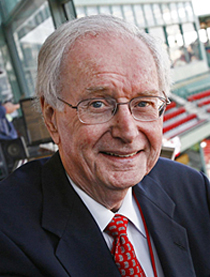
Culture
The proposal to use a pitch clock has been used with success on the minor-league level. It has resulted in games being 21 minutes shorter. Practically, everyone is for it, with the exception of one group. The players. If they oppose it, it's dead on arrival.

Flavin
Early this past offseason, baseball was looking down the barrel of a painful and ugly work stoppage. There were some, however, who saw in it an opportunity to install some much-needed reforms to impact the pace of the game and to bring it into the 21st century. Sure enough, the work stoppage came in the form of a lockout of the players' union put into place by the owners. It was as ugly and as painful as we had feared. But the much-needed reforms are still missing.
In fact, if anything, baseball regressed. Last year, MLB put a few reforms into effect without input from the players' association. One reduced doubleheader games from nine to seven innings. The other called for each half inning of extra inning games to begin with a runner on second base. Both were designed to speed up the pace of the game. The runner-on-second rule was admittedly gimmicky, but in practice it not only shortened extra inning games, it added a sense of tension to each half inning. When the new competitive bargaining agreement was announced, however, both reforms ended up on the cutting room floor, so we're right back where we started.
Look for baseball games to last as long or longer than ever this year.
As for other reforms, such as the installation of pitch clocks, or "timers," as commissioner Rob Manfred calls them, the banning of shifts, electronic calling of balls and strikes, and changing the size of the bases, they have all been kicked down the road to be dealt with later.
The proposal to use a pitch clock has been used with success on the minor-league level. It has resulted in games being 21 minutes shorter. Practically, everyone is for it, with the exception of one group. The players. If they oppose it, it's dead on arrival. A special committee is due to report on the matter in 2023. I'll believe the pitch clock is a reality when I see it, but not a moment before.
If baseball really wanted to shorten the length of games, it could do so very easily by reducing the time between innings. It used to be that when a team made a third out, its players would immediately pop out of the dugout to assume their defensive positions. I clearly remember reading stories about the DiMaggio brothers exchanging greetings as they passed each other between innings. Now it's at least a 30-second delay before anyone takes the field. It's not that they're lazy; they can't start the next inning until the commercials are over. Radio and especially television represent huge portions of every team's revenue. The alternative to watching all those commercials is not being able to watch baseball games on television, so I guess we'll put up with it.
Everyone has an opinion on the banning of shifts. Mine is that a team, by shifting, leaves a portion of the field uncovered, and it is up to the hitter to make the proper adjustment to take advantage of that. MLB shouldn't have to legislate against it. Some day a team is going to have great success going the other way, and shifts will find their natural places -- good strategy sometimes, not so good at others. Even Ted Williams, famously stubborn about hitting against the "Williams shift," used by the Cleveland Indians, in which the outfielders as well as the infielders dramatically over-shifted against him, crossed them up by deliberately hitting a line drive to left field on Friday the 13th of September, 1946. The result was an inside-the-park homer, the only one of his career, which won the pennant for the Red Sox, one to zero. Let the defending team know it's taking a chance by shifting. Don't legislate against them.
Balls and strikes have always been an issue. Watching the game on television it seems like 10 percent of the calls are questionable. This is not a knock on umpires. Judging whether or not a ball traveling in excess of 90 miles per hour is over the corner of the plate or not can't be easy. Many advocate that taking the element of human error out of the equation by using technical means would be fair to both hitters and batters, but we have to wait until we hear from the special committee in 2023 before we'll know of the success or failure of the idea.
Increasing the size of bases, we are told, will add incentive to stealing bases, which has fallen out of favor in recent years.
Most of those proposals, particularly the installation of pitch clocks, are favored by the owners. They took a fearful public relations beating over the lockout, positioning themselves as villains by calling it in the first place. The owners, we were told in column after column, were just rich, money-grabbing millionaires who did not really care for the game. Yet they managed to reach agreement with the players' association on the issues dealing with dollars and cents. But, with the exception of the universal designated hitter by the National League (which took 49 years to become a reality), not one proposal to reform how the game of baseball is played has gone into effect. We'll have to wait until 2023 to see how that special committee charged with handling all the issues regarding playing reforms performs, but for now, at least, MLB must be wondering if the lockout was worth it.
- Dick Flavin is a New York Times bestselling author; the Boston Red Sox "Poet Laureate" and The Pilot's recently minted Sports' columnist.
Recent articles in the Culture & Events section
-
Scripture Reflection for April 14, 2024, Third Sunday of EasterDeacon Greg Kandra
-
St. Helena's House is established in the South EndThomas Lester
-
Is this synodality?Russell Shaw
-
Poking the hornet's nest of IVFFather Tadeusz Pacholczyk
-
A eucharistic word: MissionMichael R. Heinlein


















